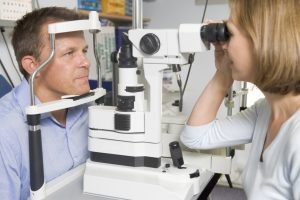
According to one ocular hypertension study, between 4.5 and 9.4 Americans aged 40 or older have ocular hypertension, which increases their risk of developing glaucoma. Glaucoma threatens sight. It is interesting to note that some people can have an abnormal eye pressure without experiencing vision loss, while others suffer significant vision damage.
Although there is no defined upper limit for ocular pressure as it can vary in different persons, generally the normal reading is 21 mm Hg.
Natural home remedies to manage ocular hypertension
Adjust your diet: Because ocular hypertension is often seen in those who have diabetes, are obese, or have high blood pressure, it’s important to control these risk factors – which can be achieved with simple diet changes. Patients are advised to avoid salt, reduce their sugar intake, and eating a healthy diet including grains, fruits and vegetables, low-fat dairy, and lean protein and fish.
Exercise: Exercise can help further reduce risk factors associated with ocular hypertension. It is recommended that you exercise for at least 30 minutes a day, three to five times a week. On the other hand, it’s important that you avoid exercises in which your head is in a downward position as this can increase pressure.
Avoid trans fats: Often found in processed foods, trans fats prevent omega-3s from working properly, which is problematic because omega-3s can help improve ocular hypertension. Along with processed foods, trans fats can be found in ice cream, microwavable foods, and ground beef.
Eat foods high in antioxidants: Antioxidants fight off free radical damage and oxidative stress which can cause internal damage, especially to your eyes. Good sources of antioxidants include dark colored berries, grape seed extract, and pomegranates.
Use medical marijuana (where legal): Medical marijuana has been shown to treat high ocular hypertension and does not cause psychotropic effects.
Keep hydrated: The Mayo Clinic reports staying well hydrated can reduce eye pressure throughout the day. On the other hand, it is not advised to drink large amounts of water at once, as that can increase pressure.
Reduce stress: Just as stress can raise your blood pressure, it can also raise your ocular pressure, too. Reducing stress is then an ideal remedy for lowering ocular pressure.
Limit caffeine consumption: Coffee is a stimulant known to raise blood pressure. Reducing your intake of caffeinated foods and beverages can help lower ocular pressure.
Relaxation exercises to manage ocular hypertension
As mentioned, stress can raise ocular hypertension, so it’s a good idea to practice relaxation exercises in order to reduce eye pressure. Here are some techniques you can try.
- Try blinking every three to four seconds, especially when staring at a screen.
- Cover one eyelid with the palm of your hand and blinking frequently. Ensure your hand is not adding additional pressure to the eye.
- Trace an imaginary figure eight with your eyes. Imagine the number eight in front of you and move your eyes in a figure eight pattern.
- Focus on near and faraway objects. Hold your thumb 10 inches away from your face and focus on it for 10 seconds.
- Switch your focus on something that is far away for about 10 seconds and repeat.
By practicing these eye exercises and relaxation techniques, you can better manage your ocular hypertension.